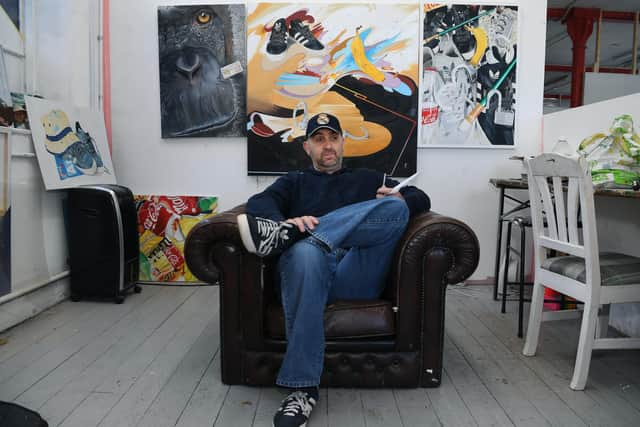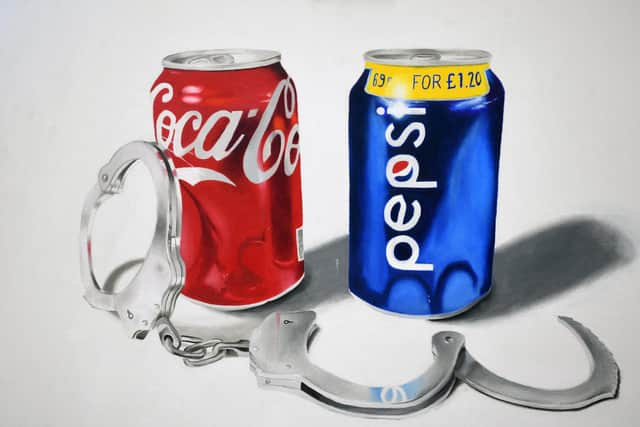Meet the reformed career criminal Kevin Devonport who credits art for turning his life around
Kevin, who openly admits to being a reformed career criminal, explained: “My daughter’s memories will be of spending time in art studios and travelling the world with me, picking up awards. It’s a lot better than what I had.”
The self-taught artist, who grew up in a ‘poor, rundown area’ and left school with no qualifications, says that art didn’t figure in his life at all for many years. “When I was growing up, I saw nothing about art, and there were no career pathways into it.” This lack of opportunity for young people from deprived backgrounds is one of reasons he dislikes what he sees as the elitism of the art world. “Art should be open to everyone. Why should art only be for certain groups of people? The cave men did it on their cave walls; we’ve been creating art since time immemorial.”
Advertisement
Hide AdAdvertisement
Hide AdKevin only discovered his passion for painting during the years he spent in prison, where he served four separate sentences for drugs offences. He describes art as his ‘salvation’ and its impact on his life has been transformative, prompting him to turn his back on his criminal past and opening up a whole new world that he’d never realised could be an option for him.


“I started painting ten years ago, when I was in prison. It was a hobby at first and I wasn’t particularly good. However, I believe anyone can do it, it’s just that we all have different starting points. I say, just forget it and enjoy the process.” Kevin, who’s also an army veteran, credits one particular art teacher, whose classes he attended during time served at Lindholme Prison near Doncaster, with giving him the chance to develop his work. “It was a turning point for me as I was in his class for two years. I really got myself together in that class, it was all to do with how he ran it. It wasn’t just a class that you did for a few weeks to get a certificate.”
Despite discovering his flair for art, after leaving prison Kevin had intended to embark on a Masters degree in Criminology, having already gained a first class BSc Hons degree in Sociology. His long-term plan was to use his experience of the criminal justice system to try to secure employment in rehabilitation or youth work.
“I’d never looked at art as a full-time career, so I applied to Leeds University to do my Masters but then Covid happened and the course was cancelled.” In a strange twist of fate, this resulted in him securing part-time employment as a support worker with the award-winning mental health charity Community Links and he now teaches art to people in the Leeds area three days each week. The remainder of his time is spent at Assembly House, an artist-led creative studio based in a former mill at Armley. He also visits prisons with the charity Care After Combat, which offers mentoring to veterans serving prison sentences.
Advertisement
Hide AdAdvertisement
Hide AdDespite his steadfast belief that art is for everyone, he’s still sometimes taken aback by the response to his paintings. Following a trip to Madrid for the launch of a book of international artists that he features in, which will be housed in the Spanish National library, he was expressed genuine surprise that some of the people he met recognised him through his work.


“In the early days, I gave my paintings away and was happy about it, but I’ve now sold quite a few for four figure sums and have galleries wanting to display my work and collectors following me too. There’s not many working class, council estate kids in the art world. This period in history is the best time to be an artist, but everyone in the art world is trying to be different and original. I seem to succeed just by being myself.”
Kevin is aware that his transparency about his criminal background will not sit well with everyone but believes that it’s integral to his personal story, and to his art. “This is me, I’ve never hidden it. People either like you or dislike you for it. When I first started painting, my criminal associates were equally amazed that I’d be into painting. I try not to put people into little moulds.” Paraphernalia associated with criminality, such as knuckle dusters, regularly make an appearance in his contemporary paintings, most of which are still-life scenes created using oil or acrylic paints. “I like to paint the traditional genres, particularly still life, with an element of realism. However, my images do have a contemporary essence. I have a particular fondness for painting mundane objects.” However ‘mundane’ the objects in Kevin’s paintings may appear, there’s a huge amount of symbolism in his work, with battered pairs of trainers - another recurring theme - representing Kevin himself and his journey through life. He’s keen that people should understand the hidden meaning and not jump to conclusions about his work. “I don’t think people fully understand my visual language yet. For example, some people thing my work is pro crime, but it’s actually about the end of my criminal past. Others have labelled it Pop art, possibly because Coca-Cola bottles and other branded items sometimes appear in my work, but a lot of it’s about consumer culture.” In the relatively short time since Kevin became an artist, he’s won a number of prestigious prizes, including a bronze Koestler Award for arts in criminal justice. More recently, he has received The Olympic Art Prize, the Leonardo Da Vinci International Award and The Carravagio Master Artist Award.
Kevin’s work can also be seen at Art of Protest Gallery on Walmgate, York and at The Boomer Gallery in London.